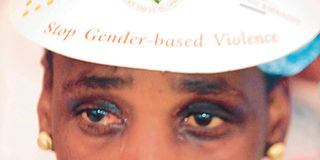DR Congo ‘world’s rape capital'

A woman weeps as she listens to a rape victim narrate her ordeal. More than 8,000 women were raped in Congo during fighting in 2009, the UN says. Photo/FILE
The Democratic Republic of Congo is “the rape capital of the world”, a senior UN official has said. Margot Wallstrom, the UN’s special representative on sexual violence in conflict, urged the Security Council to punish the perpetrators in DR Congo.
Rape remained a dominant feature of the ongoing conflict in eastern DR Congo, with impunity being the rule rather than the exception, she said. More than 8,000 women were raped during fighting in 2009, the UN says. “Women have no rights, if those who violate their rights go unpunished,” Ms Wallstrom told the UN Security Council on her return from DR Congo.
“If women continue to suffer sexual violence, it is not because the law is inadequate to protect them, but because it is inadequately enforced,” she said. The UN mission in DR Congo, Monuc, has been trying to deal with the problem by escorting women on their way to market, developing early warning systems and working with local officials, according to a UN statement.
In April, research on sexual violence in DR Congo’s eastern South Kivu province produced shocking findings. The report by the Harvard Humanitarian Initiative showed that 60% of rape victims in South Kivu were gang raped by armed men, more than half of the assaults took place in the victims’ homes and an increasing number of attacks were being carried out by civilians.
Eastern DR Congo is still plagued by army and militia violence despite the end of the country’s five-year war in 2003. Monuc troops have been backing efforts to defeat rebels linked to the 1994 genocide in Rwanda, who are operating in eastern DR Congo. Earlier, a rights group accused the country’s army of killing at least 11 civilians as it retook the airport in Mbandaka from rebels this month.
The Asadho campaign group says it has confirmed 11 killings but suspects another 31 during the Easter attack. Nine of the dead had been in detention for three months but were then accused of being rebels and killed, it said. The attack, which followed clashes over fishing rights, left two UN staff dead.
DR Congo’s army has a reputation for brutality and stealing from and raping the people it is supposed to protect. Thousands of former rebel fighters have joined the army under various peace deals.




